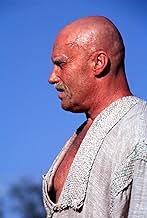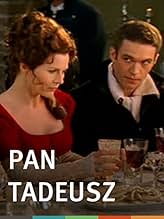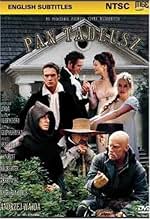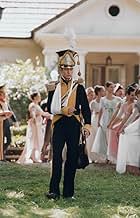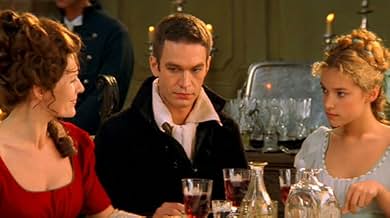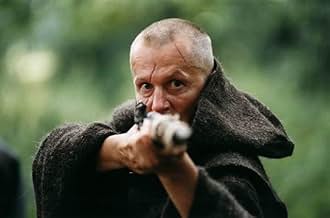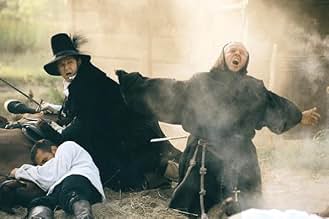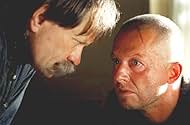Füge eine Handlung in deiner Sprache hinzuIn the early 1810s, Poles, part of Russia's client state of Lithuania, think independence will come if they join forces with Napoleon when he invades Russia. This unity of purpose, in one di... Alles lesenIn the early 1810s, Poles, part of Russia's client state of Lithuania, think independence will come if they join forces with Napoleon when he invades Russia. This unity of purpose, in one district, is undermined by two families, feuding since the head of one shot the head of the ... Alles lesenIn the early 1810s, Poles, part of Russia's client state of Lithuania, think independence will come if they join forces with Napoleon when he invades Russia. This unity of purpose, in one district, is undermined by two families, feuding since the head of one shot the head of the other twenty years before. There are hopes of a reconciliation through a marriage of Pan T... Alles lesen
- Auszeichnungen
- 7 Gewinne & 5 Nominierungen insgesamt
- Zosia Horeszkówna
- (as Alicja Bachleda-Curus)
- Rykow
- (as Siergiej Szakurow)
Empfohlene Bewertungen
The dialogue is drawn directly from the poem so it is in rhyming couplets. The acting styles and set design marvelously match the romantic, expressive language. The poem was published in 1834 and Adam Miczkiewicz was, I understand, influenced by Walter Scott. The English subtitles fail the film badly. They should have taken the risk of using a translation in a similar style. Unfortunately, for a non-Polish speaking person, I expect it is like watching Shakespeare translated into the language of the evening news. It looks terrific but a lot of the richness is missed.
But why the costume drama? I really wish he'd left this one alone.
It's not unlike 1999's other bloated Polish historical epic, "Ogniem i mieczem" ("With Fire and Sword"). Here again Poles put aside their differences to prove they're the greatest people, or at least the greatest Slavs, on Bóg's green earth. Rah, rah. A crowd of Polish lesser gentry (rabble) armed with swords can defeat trained Russian musketry any day.
And, yes, I am of Polish descent myself, although I'm embarrassed to admit it in this jingoistic context. That's why I was at the special screening in the first place, sponsored by Toronto's Polish newspaper.
"Pan Tadeusz" shares another characteristic with its elephantine contemporary: its ability to confuse non-Polish-speaking members of the audience with its vast number of characters and their poorly defined interrelationships.
Both films too have a sudsy quality. So did "Gone With The Wind", but then character definition makes that historical epic a success. Tadeusz and Zosia are indistinct phantoms as personalities. Certainly no Rhett or Scarlett.
"With Fire and Sword" is more melodramatic than "Pan Tadeusz", but it's also more exciting. This film has a laudable grandeur which Wajda brings to the proceedings, but still I wish he'd picked a subject with a bit more substance.
Wojciech Kilar can be congratulated on his score. And Daniel Olbrychski is always good to see, even with scars all over his head.
It should be noted that Polish-speaking spectators at the theatre appeared to find this film quite enjoyable. They would be chuckling at clever turns of phrase in the dialogue, while the English titles would be saying something indescribably prosaic. Evidently the film loses nearly everything in translation.
First of all, the screen play was created in a very unusual way. The dialogs were not written, but extracted from the poem, some of them being full rhyming lines and some only parts. Of course most of the meaningful and informative pieces were in the narrative section of the poem and somehow didn't make it to the screen. I'm all for "show not tell", but "don't show, don't tell, everybody knows it all from school" is not the top shelf of movie-making to me.
All that is shown is pretty people, pretty costumes, pretty interiors, pretty nature. Definitely pleasant to see for anyone who likes pictures with historical settings and would like to get to know something about the life in a particular time and place.
The movie really works only for people who have read the poem and have been taught about its historical background. After such preparation they can enjoy this multimedia reconstruction of the characters and places from the book, because that's rather what it is to me. Indeed, all the actors are good, music memorable and all the details nicely done, but this production really lacks the cinematic backbone and something that would allow it to be a movie on its own.
The goals of watching being purely patriotic, the movie appeared to us as convincing, more to say, interesting from the very beginning. However, the experience of the movie was not merely a patriotic awareness that would truly be applied to a limited number of viewers but something much more, something I would like to share with other people no matter what nationality, upbringing, culture they are - a treasure that seems lost in most modern movies yet found in the great effort to craft cinematic productions based on classical literature. Certainly, it is a serious effort to adapt 1800s' romantic verses to the expectations of modern movie buffs...
"O Lithuania, my country, thou Art
like good health; I never knew till now
How precious, till I lost thee."
(translation by Kenneth R. Mackenzie)
That is how PAN TADEUSZ by Adam Mickiewicz begins, that is how PAN TADEUSZ by Andrzej Wajda ends and what is in between?
A great story of courage, love, sensation, uprising, honor, politics (in the times of Napoleon - a great hope for the partitioned Poland), confession and ... reconciliation: something classical, universal, touching, humane, pure and upright. One could indeed enumerate such adjectives... How does it work in practice? On the one hand, we have a particular focus on national identity and duty while, on the other hand, the emphasis is drawn upon particular characters. To view comes young Tadeusz Soplica (Michal Zebrowski) in love with two female characters: one is Zosia (Alicja Bachleda) – a 14-year-old girl of youthful, innocent joys; the other is Telimena (Grazyna Szapolowska) - a lady of extravagant behavior and tastes of luxury. In between come various characters, including impetuous Gerwazy (Daniel Olbrychski), young count-artist Horeszko (Marek Kondrat), and a humble priest Robak (Boguslaw Linda) who hides his secret till the very last hour of his life ...
The factor that goes with characters and, more specifically, the manner we perceive them is the strongest point of the movie: performances. Although the task to play the roles and say their lines in poem appears to be particularly difficult, most of the cast craft their performances with exceptional flair. It is thanks to them that we all may feel the story go on naturally. Daniel Olbrychski is magnificent as Gerwazy focusing on the aforementioned impetuosity, Boguslaw Linda can be referred to as 'convincing modesty', Ms Szapolowska says her lines with desirable elegance and Michal Zebrowski together with youthful Alicja Bachleda are a fine staff for the couple in love.
Since Mickiewicz payed particular attention to the descriptions of nature, the film does not skip this aspect. It can boast wonderful shots of the green fields, memorable clouds, returning storks, silent forests and beautiful sunsets. Being filmed in an artistic manner, it evokes a unique atmosphere and constitutes a sort of moving painting of idyllic landscapes. The narration by Adam Mickiewicz portrayed by Krzysztof Kolberger adds more importance to it providing the emotions of the author. The brilliant direction by Andrzej Wajda and the musical score by Wojciech Kilar supply a viewer with undeniable experience. Moreover, some scenes remain so intensely in the memory that any sensitive viewer (sensitive to art) will truly be absorbed by watching. Here, I would like to mention famous bear hunting, confession of Jacek Soplica and witty but elegant coffee making sequence. Just a pity there is not a famous mushroom picking tour described widely by Mickiewicz.
If you asked me what this movie means to me, my answer would be simple: an experience for eyes and soul, great cinema which returns after a period of absence, which returns like the upright storks that long for the sublimity of patriot's homeland.
Wusstest du schon
- WissenswertesA polonaise composed by Kilar for this soundtrack gained a nation-wide recognition and became the opening tune for most high school proms. Before the movie the first dance was traditionally accompanied by Chopin.
- VerbindungenReferenced in Poranek kojota (2001)
Top-Auswahl
- How long is Pan Tadeusz: The Last Foray in Lithuania?Powered by Alexa
Details
- Erscheinungsdatum
- Herkunftsländer
- Sprache
- Auch bekannt als
- Pan Tadeusz: The Last Foray in Lithuania
- Drehorte
- Oporów, Lódzkie, Polen(castle)
- Produktionsfirmen
- Weitere beteiligte Unternehmen bei IMDbPro anzeigen
Box Office
- Budget
- 12.500.000 PLN (geschätzt)
- Laufzeit2 Stunden 27 Minuten
- Farbe
- Sound-Mix
- Seitenverhältnis
- 2.35 : 1
Zu dieser Seite beitragen


